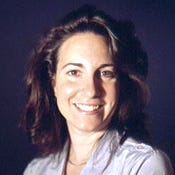TecAccess: Making Technology Accessible To AllTecAccess: Making Technology Accessible To All
A couple of weeks ago, we met Megan Duckett, founder and CEO of Sew What?, a provider of fabric sets for stage productions. This week, we say hello to another female entrepreneur with a compelling story to tell: Debra Ruh, who heads up TecAccess, a 50-person operation in Rockville, Va.

A couple of weeks ago, we met Megan Duckett, founder and CEO of Sew What?, a provider of fabric sets for stage productions. This week, we say hello to another female entrepreneur with a compelling story to tell: Debra Ruh, who heads up TecAccess, a 50-person operation in Rockville, Va.The hallmark of many successful people is the ability to turn a difficult situation on its head, and Ruh is no exception. When it dawned on her that her daughter, who has Down syndrome, would have "limited opportunity for gainful employment," she decided to put her technology expertise to good use. She started a company with a cause. Through TecAccess, Ruh is making Information and Communication Technologies (ICT) accessible to everyone, whether learning-disabled, elderly, physically handicapped, or mentally ill.
Ruh works with companies across the gamut -- high-tech giants such as Canon, Dell, HP, and IBM; social media players like Facebook, Twitter, and YouTube; search-engine behemoth Google; financial institutions including Bank of America, Ernst & Young, and Wells Fargo; and many, many more. Through the IT, marketing, or diversity arms of these organizations, she strives to ensure that websites, technology products, and communications devices can be used and operated by anyone.
"With many of these companies, it's not that they're deliberately excluding people. It's just that 'accessibility' isn't on their radar," says Ruh. "This is socially conscious work we're doing, and a number of people I've worked with have become lifelong advocates of the cause."
But TecAccess does more than promote accessibility; it helps businesses succeed by "reducing [their] risk and maximizing [their] value based on crucial international accessibility mandates." In other words, the company demonstrates to clients how making their products and services accessible can boost their bottom lines. Combining social consciousness with better business -- you can't beat that, can you?
As the founder and CEO of TecAccess, Ruh has had to demonstrate persistence, creativity, and moxie to accomplish her goals. But she's getting the job done, making the world accessible one product and service at a time. Around 2002, Canon approached TecAccess to find out how the accessibility consultancy would envision an accessible photocopier. One of TecAccess' employees, a quadriplegic himself, drafted a 15-page report, which was sent to Canon's New York-based engineers, and ultimately to Canon's world headquarters in Tokyo, for review. The outcome? Many of the features outlined in the report -- a Braille keypad, swivel display, and audible job confirmations, for example -- have been incorporated in select Canon copier models.
Here's another really interesting fact about Ruh's company: More than 80% of her staff has a disability. Some are blind; some have limited or no use of their arms or legs; some are mentally ill. "They're all technologists, and I don't hire them because of their disabilities," Ruh says. "I hire only people who can do the job I need them to do. But this is a real differentiator for us. Who better to do accessibility consulting than people who need accessible products and services?"
About the Author
You May Also Like






